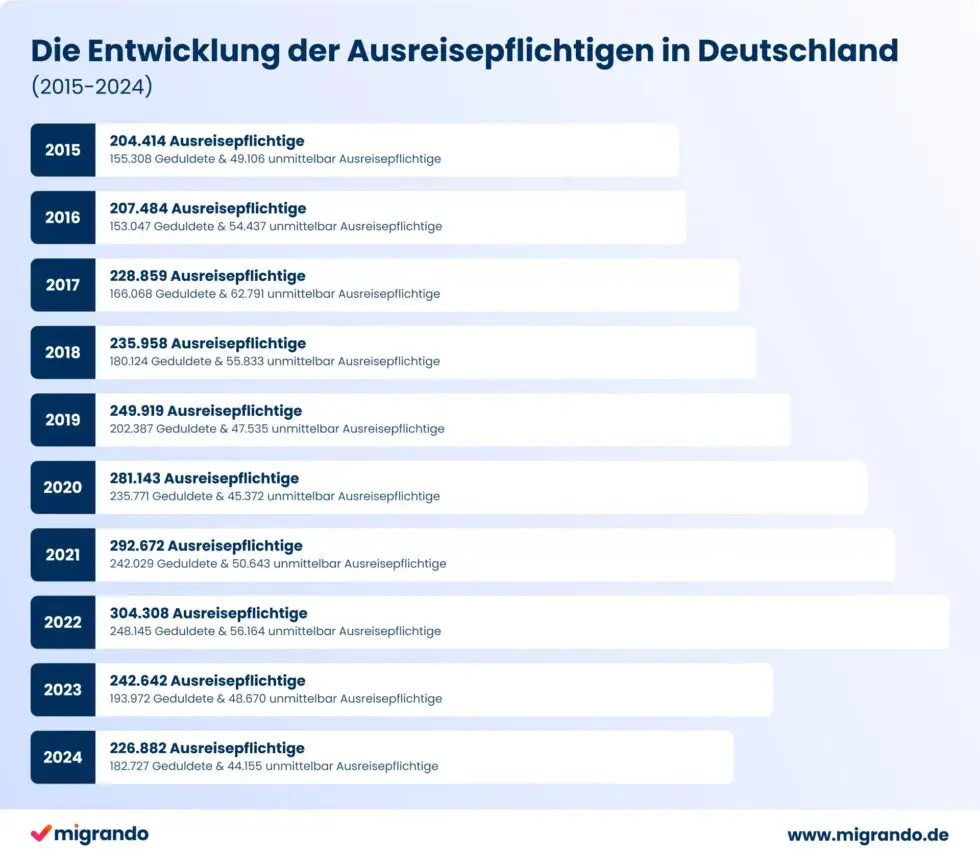What is § 104c AufenthG?
The Residence permit § 104c AufenthG offers people with a Tolerance permit in Germany the the opportunity to change to legal residence. Therefore Section 104c of the Residence Act also called right of residence referred to as the right of residence. In the following video, we explain how you can obtain a simple right of residence from Tolerance permit :
So that you understand what § 104c AufenthG and what it means exactly, the following sections will explain the most important most important basics.
Why does § 104c AufenthG exist?
The new law on Section 104c AufenthG has been in force since December 31, 2022. An important reason for the change in the law is the long timethat many people have been living in Germany with tolerated status and have already integrated well.
Statistics from the Migration Media Service shows how the number of tolerated people has increased more and more over the years. over the years. The aim of the Federal Government is to reduce this number by amending Section 104c of the Residence Act.
Who gets § 104c AufenthG?
Section 104c of the Residence Act applies to people who on October 31, 2022 have lived in Germany for at least 5 years. When applying, it is important that these people have a tolerated status. It does not matter whether you have been tolerated or permitted in the past 5 years or whether you had a residence permit.
The Residence permit § 104c para. 2 can family members of people who already have a Residence permit in accordance with Section 104c (1) AufenthG.
§ Section 104c AufenthG is issued once and cannot be extended. This Residence permit is valid for 18 months. During this time, you must ensure that you change Residence permit in good time. If you do not do this, you will slip back into the Tolerance permit after the 18 months have expired.
Naturalization with § 104c AufenthG?
The 2 types of § 104c AufenthG
The Residence permit § 104c AufenthG is divided into two different types divided into two different types: Sec. 104c (1) AufenthG and Sec. 104c (2) AufenthG. Both types have different requirements and conditions:
- The Residence permit Section 104c (1) AufenthG is for those who are in a tolerated stay status. status. You must have had this status for at least 5 years without interruption. After receiving the opportunity residence title, you have 18 months to fulfill all the requirements for a right of residence under § 25a or 25b AufenthG and apply for this.
- The Residence permit § 104c Para. 2 AufenthG if a family member already has Residence permit § 104c Para. 1. You then have the same opportunity to obtain the right of residence under § 25a or 25b AufenthG within 18 months.
How do I get the right of residence?
Although there are two different types of right of residence, the application process is the same for both types. application is the same for both types. We will now explain how to apply for the right of residence:
Application for § 104c AufenthG
- Collect all the necessary documents and evidence.
- Go to the relevant Foreigners' office - there (or online) you will receive an application for a residence application for a residence permit and, in some cases, an appointment to submit the application.
- Submit the application with the complete documents in good time.
- Once you have submitted your application to Foreigners' office , the authority has 12 weeks to process your application.
If nothing has happened within these 12 weeks, you can file a Lawsuit for failure of act to the administrative court. In this case, the Administrative Court will set a new deadlineby which your application must be processed. You will then receive the result of your application at the latest.
The application costs €100 for adults and €50 for children. If you receive citizen's allowance and have a notification from the job center, these fees can be waived.
Granting of § 104c AufenthG
After everything has been checked, you will be contacted by Foreigners' office . In most cases, the application for § 104c AufenthG is positive. This means that you will receive your card at Residence permit.
However, sometimes the application for § 104c AufenthG is rejected. If the rejection is unfounded, you have the option of appealing to the administrative court within 1 month to file a complaint with the administrative court or appeal to the competent Foreigners' office . Whether an objection or an appeal is necessary varies from authority to authority.
§ Section 104c AufenthG Prerequisites
Depending on which type of right of residence you have, small differences in the conditions. In the following table you can see which conditions and documents you need for which type of right of residence:
Conditions & Documents | § Section 104c (1) AufenthG | § Section 104c (2) AufenthG |
|---|---|---|
Tolerated status
| ✔ | ✔ |
Proof of 5 years tolerated status
| ✔ | X
|
Commitment to the free democratic basic order | ✔ | ✔ |
Impunity
| ✔ | ✔ |
No misrepresentation of identity or citizenship
| ✔
| ✔
|
Proof of possession of § 104c AufenthG para. 1 of a family member
| X
| ✔
|
§ Section 104c AufenthG can also be applied for if you do not have a passport or a valid passport.
The advantages of § 104c AufenthG
The Residence permit § 104c AufenthG has several advantages. These relate to both travel and work as well as the crediting of the period of residence. You can find out all the details about these benefits below.
Travel with § 104c AufenthG
Traveling with § 104c AufenthG is generally possible. The decisive condition is that you have a valid national passport passport. With this travel document, you can travel throughout the Schengen area and to third countries. third countries. When traveling outside Germany, you must also re-enter the country within 6 months otherwise your Residence permit will expire.
Also the Travel to your home country works without any problems with § 104c AufenthG. So you don't have to worry about getting into trouble with the authorities or even losing your Residence permit .
Working with § 104c AufenthG
You can use § 104c AufenthG work without any problems. It is completely irrelevant whether the work is temporary, permanent or self-employed.
You also do not need approval from the Federal Employment Agency and are not bound by any requirements in this regard. In § Section 4a (1) sentence 1 AufenthG you will find a detailed description of all the requirements for working with Section 104c AufenthG.
Performance support
It is not necessary for your livelihood to be secured in order to obtain § 104c AufenthG. Therefore, with your right of residence you have access to benefits according to SGB II or XII. These include
- Social and health care services,
- Assistance with care or living expenses and
- basic income support for jobseekers.
However, in order to be able to switch to § 25a or 25b AufenthG after 18 months, you must refrain from receiving public funds (such as citizen's allowance).
Crediting the length of stay
The 18 months residence with § 104c AufenthG will be granted to you for the Settlement permit and the Naturalization are recognized, as this is a legal Residence permit residence permit. You therefore do not have to start from scratch when you switch to the right of residence.
This means that if you have changed to Sec. 25a or 25b AufenthG after 18 months, you can keep your Settlement permit or your Naturalization apply more quickly.
The disadvantages of Section 104c AufenthG
Like so many other things, the right of residence not only advantages with it. It is important that you are also aware of these disadvantages. This is the only way you can be prepared for them and save yourself potential trouble. You can find out about the specific disadvantages in the following sections.
§ Section 104c AufenthG is limited in time
The right of residence is without the possibility of an extension with 18 months limited in time. From the time you receive § 104c AufenthG, you should therefore make every effort to be able to switch to a right of residence under § 25a or 25b AufenthG after it expires. Ideally, you should organize all the necessary documents for the application for the right of residence immediately after receiving § 104c AufenthG.
Family reunification is not possible
With § 104c AufenthG you can not submit an application for family reunification as they are not covered by the legal requirement in § 29 para. 3 sentence 3 AufenthG is blocked. The reason for the block is the time limit on your residence permit.
For family reunification security guarantees are required for the period after the 18 monthswhich you do not have with a temporary Residence permit . You will therefore have to wait until you have changed to another right of residence where you can apply for family reunification.
No entitlement to integration courses
In order to be able to switch to the right of residence after 18 months with § 104c AufenthG, you must German language skills at A2 level level. However, as a holder of the right of residence, you are not entitled to take part in an integration course.
You can therefore only learn the German language skills required for the right of residence yourself or, if an integration course still has free places has free places (§ 44 para. 4 sentence 1 AufenthG).

The way to Settlement permit
You cannot not switch directly from the right of residence to the Settlement permit change. You have to take a detour:
- From the right of residence on opportunity to the right of residence: After 18 months you can switch to the right of residence according to § 25a or 25b AufenthG.
- From the right to stay to Settlement permit: In this checklist you will find all the requirements and documents needed to apply for the Settlement permit.
You can also switch from the right of residence according to § 25a or 25b AufenthG to Naturalization instead. You can find the necessary documents for Naturalization in this checklist.
§ Section 104c AufenthG - from Tolerance permit to the right of residence
By being granted a right of residence, you will have the opportunity to build up a livelihood and integrate into social and economic life. Despite the many advantages of § 104c AufenthG, such as the crediting of the duration of residence, there are also disadvantages, especially with regard to family reunification. These restrictions can affect the personal and family planning security of those affected.
FAQ - Frequently asked questions about Sec. 104c AufenthG
What is § 104c AufenthG?
104c AufenthG is a Residence permitwhich is intended to offer an opportunity to people who have been living in Germany for a long time with tolerated status. They are given the opportunity to establish a long-term existence in Germany. After 18 months in § 104c AufenthG, they can switch to a long-term right of residence.
Who gets § 104c AufenthG?
Persons who are October 31, 2022 have lived in Germany for at least 5 years without interruption and had a toleration status can apply for § 104c AufenthG.
What comes after § 104c AufenthG?
After 18 months in § 104c AufenthG you can change to a right of residence. Only then is it possible to apply for Settlement permit or Naturalization .
Can I travel with § 104c AufenthG?
Yes, it is possible to travel with § 104c AufenthG (right of residence). You can travel throughout the Schengen area and to third countries. However, you must return to Germany within 6 months, otherwise your Residence permit will expire. You can also travel to your home country under Section 104c of the Residence Act. It is important that you have a valid travel document and the Residence permit § 104c AufenthG with you when you travel.
Is family reunification possible with § 104c AufenthG?
NoFamily reunification is not possible with § 104c AufenthG. The reason is that Residence permit is only valid for 18 months. However, proof of security is required for family reunification. In order for your family to be able to join you, you must first change to another Residence permit .








